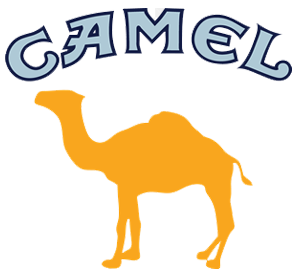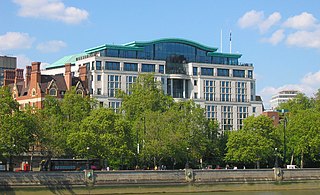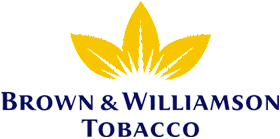
Chevrolet, colloquially referred to as Chevy, is an American automobile division of the manufacturer General Motors (GM).

The R. J. Reynolds Tobacco Company (RJR) is an American tobacco manufacturing company based in Winston-Salem, North Carolina, and headquartered at the RJR Plaza Building. Founded by R. J. Reynolds in 1875, it is the largest tobacco company in the United States. The company is a wholly owned subsidiary of Reynolds American, after merging with the U.S. operations of British American Tobacco in 2004.

A baseball card is a type of trading card relating to baseball, usually printed on cardboard, silk, or plastic. In the 1950s, they came with a stick of gum and a limited number of cards. These cards feature one or more baseball players, teams, stadiums, or celebrities.

Camel is an American brand of cigarettes, currently owned and manufactured by the R. J. Reynolds Tobacco Company in the United States and by Japan Tobacco outside the U.S.

British American Tobacco p.l.c. (BAT) is a British multinational company that manufactures and sells cigarettes, tobacco and other nicotine products including electronic cigarettes. The company, established in 1902, is headquartered in London, England. As of 2021, it is the largest tobacco company in the world based on net sales and the third largest seller of vapes in the UK.

Marlboro is an American brand of cigarettes owned and manufactured by Philip Morris USA within the United States and by Philip Morris International outside the US. In Canada, a separate product using the Marlboro brand is owned and manufactured by Imperial Tobacco Canada, while the international product is distributed in Canada by a unit of PMI under the name "Rooftop". Marlboro's largest cigarette manufacturing plant is located in Richmond, Virginia.

Brown & Williamson Tobacco Corporation was a U.S. tobacco company and a subsidiary of multinational British American Tobacco that produced several popular cigarette brands. It became infamous as the focus of investigations for chemically enhancing the addictiveness of cigarettes. Its former vice-president of research and development, Jeffrey Wigand, was the whistleblower in an investigation conducted by CBS news program 60 Minutes, an event that was dramatized in the film The Insider (1999). Wigand claimed that B&W had introduced chemicals such as ammonia into cigarettes to increase nicotine delivery and increase addictiveness.

The Japan Tobacco Inc. (JT) is a Japanese diversified tobacco company. It was established in 1985 as a tokushu gaisha that inherited the right to monopolize and manufacture cigarettes from the Japan Tobacco and Salt Public Corporation and required the government to hold at least 50% of its shares. In addition to tobacco, JT diversified its businesses, establishing the pharmaceutical research institute in 1993 and making a full-scale entry into the food and beverage industry in 1998. In 2008, it acquired the food manufacturer Katokichi, now TableMark, as a wholly-owned subsidiary, integrating its food business.

Imperial Brands plc is a British multinational tobacco company headquartered in London and Bristol, England. It is the world's fourth-largest international cigarette company measured by market share after Philip Morris International, British American Tobacco and Japan Tobacco and the world's largest producer of fine-cut tobacco and tobacco papers.

Swedish Match AB is a Swedish multinational tobacco company headquartered in Stockholm. The company manufactures snus, nicotine pouches, moist snuff, tobacco- and nicotine-free pouch products, chewing tobacco, chew bags, tobacco bits, cigars, matches, lighters, and other fire products with operations in Sweden, Denmark, the United States, the Dominican Republic, Brazil, the Netherlands, and the Philippines. The company's origins can be traced back to 1868, and Ivar Kreuger. Swedish Match has played an important part in Sweden's industrial development.
Liggett Group, formerly known as Liggett & Myers Tobacco Company, is the fourth largest tobacco company in the United States. As of 2014, Liggett Group was the fourth largest American tobacco company by gross revenue, though it was considerably smaller than the top three. Its headquarters are located in Durham, North Carolina, though its manufacturing facility is 30 miles to the west in Mebane, North Carolina. The company is a subsidiary of holding company Vector Group.

Cohiba is a brand for two kinds of premium cigar, one produced in Cuba for Habanos S.A., the Cuban state-owned tobacco company, and the other produced in the Dominican Republic for US-based General Cigar Company.

Philip Morris International Inc. (PMI) is an American multinational tobacco company, with products sold in over 180 countries. The most recognized and best selling product of the company is Marlboro. Philip Morris International is often referred to as one of the companies comprising Big Tobacco.
The Tobacco Master Settlement Agreement (MSA) was entered on November 23, 1998, originally between the four largest United States tobacco companies and the attorneys general of 46 states. The states settled their Medicaid lawsuits against the tobacco industry for recovery of their tobacco-related health-care costs. In exchange, the companies agreed to curtail or cease certain tobacco marketing practices, as well as to pay, in perpetuity, various annual payments to the states to compensate them for some of the medical costs of caring for persons with smoking-related illnesses. The money also funds a new anti-smoking advocacy group, called the Truth Initiative, that is responsible for such campaigns as Truth and maintains a public archive of documents resulting from the cases.

Lorillard Tobacco Company was an American tobacco company that marketed cigarettes under the brand names Newport, Maverick, Old Gold, Kent, True, Satin, and Max. The company had two operating segments: cigarettes and electronic cigarettes.

E. León Jimenes is a holding vehicle controlled by the León family with a multi-decade track record of investing in and building iconic companies in the consumer sector in Latin America. This corporation was historically involved in mainly two markets — fabrication and distribution of beverages and tobacco cultivation and manufacture of cigarettes—. The company's actual beverage portfolio includes a minority stake in Cervecería Nacional Dominicana, owner of Presidente beer, one of the top sellers in the Caribbean, in partnership withAnheuser-Busch InBev. E. León Jimenes has a diversified portfolio with investments in consumer, telecommunications, healthcare, industrials, and other sectors.

Arturo Fuente is a cigar brand founded by Arturo Fuente, Sr. in 1912 in West Tampa, Florida. Following a catastrophic fire in 1924, the brand had a production freeze for 22 years, reemerging in 1946 on a limited, local basis. Ownership was transferred to Arturo's younger son, Carlos Fuente, Sr. in 1958. Following the 1960 United States embargo of Cuba, the Fuente brand began a period of slow and steady growth, emerging as one of the most critically acclaimed makers of hand-rolled premium cigars outside of Cuba. As of 2010, the company was producing 30 million cigars per annum from its factory in the Dominican Republic.

The Family Smoking Prevention and Tobacco Control Act, is a federal statute in the United States that was signed into law by President Barack Obama on June 22, 2009. The Act gives the Food and Drug Administration the power to regulate the tobacco industry. A signature element of the law imposes new warnings and labels on tobacco packaging and their advertisements, with the goal of discouraging minors and young adults from smoking. The Act also bans flavored cigarettes, places limits on the advertising of tobacco products to minors and requires tobacco companies to seek FDA approval for new tobacco products.

Tobacco smoking has serious negative effects on the body. A wide variety of diseases and medical phenomena affect the sexes differently, and the same holds true for the effects of tobacco. Since the proliferation of tobacco, many cultures have viewed smoking as a masculine vice, and as such the majority of research into the specific differences between men and women with regards to the effects of tobacco have only been studied in-depth in recent years.
Oliva Cigar Co. is the manufacturer of several brands of cigars primarily grown and produced in Nicaragua and sold internationally. Melanio Oliva began growing tobacco in Pinar del Río, Cuba, in 1886. In 1964, in the aftermath of the 1959 Cuban Revolution, Melanio's grandson Gilberto Oliva emigrated with his family to Spain before eventually moving to Nicaragua and re-entering the tobacco business. In 1995, Gilberto and his son, Gilberto Jr., launched the Gilberto Oliva brand, which became Oliva Cigar Co. The company is currently based in Miami Lakes, Florida.
















